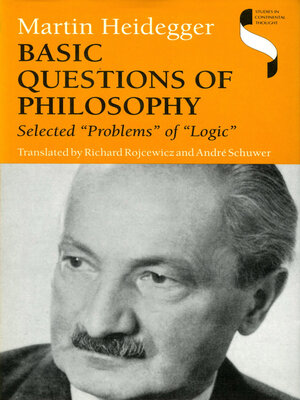Basic Questions of Philosophy
ebook ∣ Selected "Problems" of "Logic" · Studies in Continental Thought
By Martin Heidegger

Sign up to save your library
With an OverDrive account, you can save your favorite libraries for at-a-glance information about availability. Find out more about OverDrive accounts.
Find this title in Libby, the library reading app by OverDrive.



Search for a digital library with this title
Title found at these libraries:
| Library Name | Distance |
|---|---|
| Loading... |
"This excellent translation" presents Heidegger's mature thought on the essence of Truth as he was writing his major work, Contributions to Philosophy (Library Journal).
This is the first English translation of a lecture course Martin Heidegger presented at the University of Freiburg in 1937–1938. Heidegger's task here is to reassert the question of the essence of truth, not as a "problem" or as a matter of "logic," but precisely as a genuine philosophical question, in fact the one basic question of philosophy. Thus, this course is about the essence of truth as well as the essence of philosophy itself.
On both sides Heidegger draws extensively upon the ancient Greeks, on their understanding of truth as aletheia and their determination of the beginning of philosophy as the disposition of wonder. In addition, these lectures were presented at the time that Heidegger was composing his second magnum opus, Beiträge zur Philosophie, and provide the single best introduction to that complex and crucial text.
This is the first English translation of a lecture course Martin Heidegger presented at the University of Freiburg in 1937–1938. Heidegger's task here is to reassert the question of the essence of truth, not as a "problem" or as a matter of "logic," but precisely as a genuine philosophical question, in fact the one basic question of philosophy. Thus, this course is about the essence of truth as well as the essence of philosophy itself.
On both sides Heidegger draws extensively upon the ancient Greeks, on their understanding of truth as aletheia and their determination of the beginning of philosophy as the disposition of wonder. In addition, these lectures were presented at the time that Heidegger was composing his second magnum opus, Beiträge zur Philosophie, and provide the single best introduction to that complex and crucial text.







